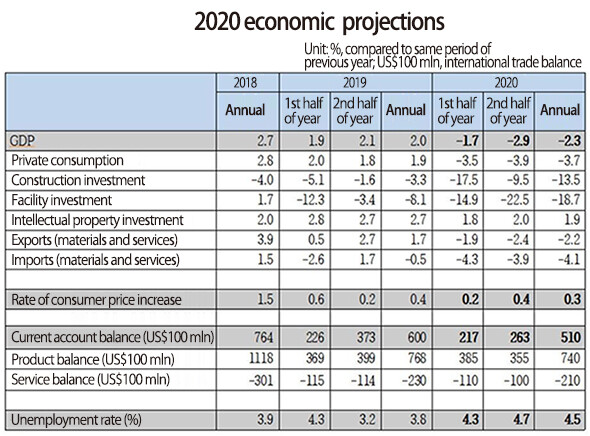hankyoreh
Links to other country sites 다른 나라 사이트 링크
S. Korea’s economic growth projected at -2.3% for 2020 by state-funded think tank

South Korea’s economic growth rate for 2020 has been projected at -2.3%, its lowest level since the Asian financial crisis of 1997.
The Korea Economic Research Institute (KERI) predicted the 2020 economic growth rate of -2.3% in a July 12 report titled “KERI Economic Trend and Outlook: Second to Fourth Quarters 2020.” The respective growth rates for the first and second half of the year were projected at -1.7% and -2.9%.
“While wide-ranging efforts are being committed to overcoming the impact of the novel coronavirus pandemic, the economic downturn trend is expected to continue due to domestic factors including the gradual worsening of economic conditions over a long period of time and the persistence of the coronavirus pandemic, as well as external factors including the larger-than-anticipated economic slowdown in major economies such as the US and China and delays in economic recovery,” KERI explained.
With private consumption in particular declined by 3.7% this year, a situation of serious stagnation was predicted to persist for some time. Despite policy efforts to boost consumption through emergency disaster relief payments and other means, the analysis concluded that they were inadequate to offset the declining rate of increase in nominal wages due to poor company performance and the reduced desire to consume amid physical constraints on consumption activities due to the infection risk.
Facility investment, which had already been experiencing negative growth, was predicted to decline by 18.7% from a year earlier due to stagnant domestic demand and economic slumps in such major export destinations as the US and China. KERI also predicted a decline of 13.5% in construction investment.
“The decline in construction investment is attributable to setbacks in construction efforts and to government policies to check real estate prices,” the institute explained.
The rate of increase in consumer prices was projected at 0.3%, a decline of 0.1 percentage point from last year. The analysis concluded that the rate of inflation has been reduced by a combination of shrinking demand amid severe recession conditions, service industry stagnation, household debt, and the aging population trend.
By Song Chae Kyung-hwa, staff reporter
Please direct comments or questions to [english@hani.co.kr]

Editorial・opinion
![[Column] Season 2 of special prosecutor probe may be coming to Korea soon [Column] Season 2 of special prosecutor probe may be coming to Korea soon](https://flexible.img.hani.co.kr/flexible/normal/500/300/imgdb/original/2024/0426/3317141030699447.jpg) [Column] Season 2 of special prosecutor probe may be coming to Korea soon
[Column] Season 2 of special prosecutor probe may be coming to Korea soon![[Column] Park Geun-hye déjà vu in Yoon Suk-yeol [Column] Park Geun-hye déjà vu in Yoon Suk-yeol](https://flexible.img.hani.co.kr/flexible/normal/500/300/imgdb/original/2024/0424/651713945113788.jpg) [Column] Park Geun-hye déjà vu in Yoon Suk-yeol
[Column] Park Geun-hye déjà vu in Yoon Suk-yeol- [Editorial] New weight of N. Korea’s nuclear threats makes dialogue all the more urgent
- [Guest essay] The real reason Korea’s new right wants to dub Rhee a founding father
- [Column] ‘Choson’: Is it time we start referring to N. Korea in its own terms?
- [Editorial] Japan’s rewriting of history with Korea has gone too far
- [Column] The president’s questionable capacity for dialogue
- [Column] Are chaebol firms just pizza pies for families to divvy up as they please?
- [Column] Has Korea, too, crossed the Rubicon on China?
- [Correspondent’s column] In Japan’s alliance with US, echoes of its past alliances with UK
Most viewed articles
- 1Division commander ordered troops to enter raging flood waters before Marine died, survivor says
- 2‘We must say no’: Seoul defense chief on Korean, USFK involvement in hypothetical Taiwan crisis
- 3Is N. Korea threatening to test nukes in response to possible new US-led sanctions body?
- 4No good, very bad game for Korea puts it out of Olympics for first time since 1988
- 5Korea’s 1.3% growth in Q1 signals ‘textbook’ return to growth, says government
- 6US overtakes China as Korea’s top export market, prompting trade sanction jitters
- 7[Column] Has Korea, too, crossed the Rubicon on China?
- 8[Column] ‘Choson’: Is it time we start referring to N. Korea in its own terms?
- 9Will NewJeans end up collateral damage in internal feud at K-pop juggernaut Hybe?
- 10Samsung subcontractor worker commits suicide from work stress